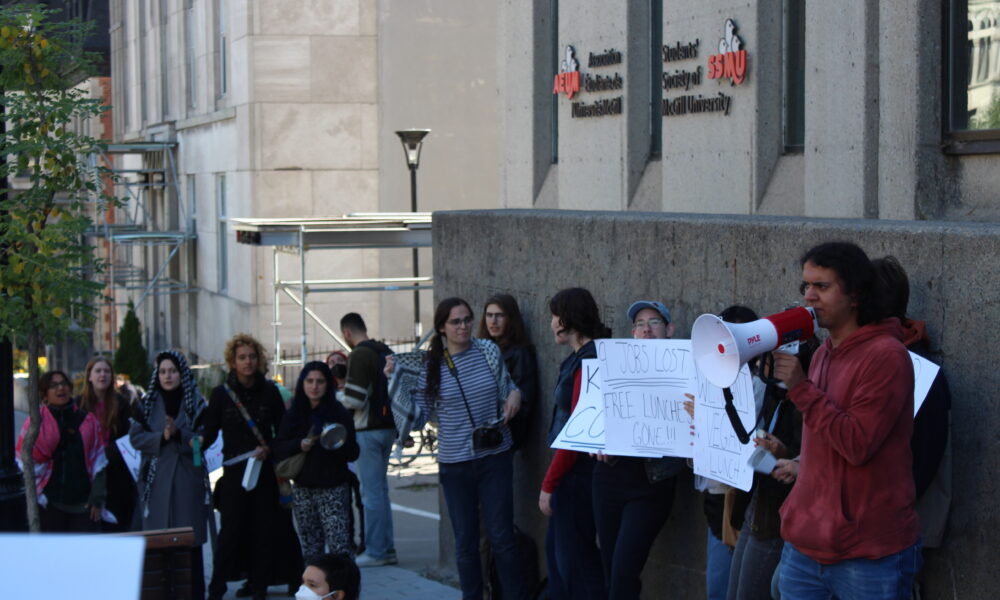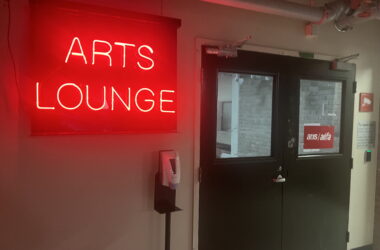On Wednesday, Oct. 1, McGill’s food accessibility collective Midnight Kitchen (MK)—largely known for its free lunch program—was dismantled by the Students’ Society of McGill University (SSMU)’s Board of Directors (BoD), who fired MK’s staff and locked the kitchen’s doors without warning. Later that day, the BoD sent an email to the student body announcing SSMU’s planned MK restructuring, attaching documentation of MK’s annual budgets from the last three school years. SSMU stated that the closure was due to MK’s failure to use its budget to meet their fee-mandated five meals per week, instead providing only two.
SSMU President Dymetri Taylor discussed the society’s decision to close MK’s program in an interview with The Tribune.
“Services are reviewed every single year, and in that first [re]view of the services it’s also a review of how they have done in preceding years, what their mandates are, whether those mandates are being followed,” Taylor said. “And in this instance, Midnight Kitchen was being reviewed to account for, particularly, [their] fee mandate of serving five meals a week, and also in comparison of how the service operated in the past.”
Taylor described MK’s budget over the past few years, noting a gradual increase in the amount it has spent on food since 2022—with a budget of $7,500 CAD for food in 2022 and over three times that amount for this school year.
“Again, [food is] budgeted for $25,000 [CAD], but then the amount of servings [MK provides] remains the same,” Taylor stated. “So then the question becomes, well, if the money is going up, but there’s no increase in the amount of servings, what is being done for students, when students are paying to get five servings a week?”
Taylor continued to speak about how the Board’s decision to cut MK resulted from the release of the kitchen’s Fall term meal schedule, which outlined two meals per week. He noted that even though it is not ideal to halt the program a month into the school year, resulting in no MK meal offerings for the rest of the semester, it allows SSMU more time to plan for a revamped MK to open in January 2026, run by a newly appointed Food Services and Hospitality Manager.
Taylor addressed why the BoD decided to provide notice of closure to MK’s employees only on the day of their termination.
“There’s different manners [with] which you can go about it,” he outlined. “One, of course, is that you give an advanced notice, like you give notice a month in advance, and then for that entire month, more or less, that person is still mandated to work until it comes to effect. [….] [The con] is that there’s then all the negative mental aspects that come with knowing that. [….] It’s not a good environment for anyone to be stuck in. The other option in the collective agreement [between SSMU and its services] is that notice can be provided when [the closure] is occurring. [….] Then, that individual also gets paid for that week that they did not receive the notice.”
SSMU’s decision to close MK sparked mixed responses from the student body. On Oct. 2, students rallied in front of the University Centre at 1:00 p.m. in support of MK, clanging cutlery, tupperware, and pots together. Some of MK’s previous staff then spoke at the rally, claiming that the BoD’s email to the student body spread misinformation and was purposefully deceitful. They mentioned that their budget does not accurately reflect the kitchen’s food intake, citing that they receive many of their ingredients through donations from Élèves des champs and Moisson Montréal.
“Not only is [MK’s closure] based on a dire misunderstanding of how cooking operations work, like the need to pay for tools, kitchen upkeep, wages, transporting food, to name a few, most of our food is donated […] which offers free surplus food products in bulk which would otherwise be wasted,” one former staff member stated.
The former staff continued by outlining unique anti-oppressive resources MK provides beyond its lunch service—offering free Solidarity Servings for community events, hosting workshops, and financially supporting social justice movements throughout Montreal—that could be endangered by SSMU’s kitchen takeover.
“The Midnight Kitchen has an anti-capitalist, anti-oppressive political mandate,” another former staff member explained. “Many of our volunteers choose Midnight Kitchen because of our political stance and outspokenness on issues that affect students. We have so much community support because we support the community. The SSMU cannot recreate this network of mutuality on their own.”
The same staff member noted that the Board not only neglected to provide advance notice of MK’s closure, but also promised days earlier at the SSMU’s Fall General Assembly on Sept. 29 that new SSMU hires’ contracts would be signed by the end of the week. Cecelia Callahan, U2 Arts and a recent MK hire, corroborated this statement in an interview with The Tribune after the rally.
“[SSMU] said that my contract would start [around] three weeks ago, but they kept delaying signing off [on] my contract, and kept saying that it would occur, and it didn’t,” Callahan explained. “Dymetri Taylor told us that they’d be signed at the end of the week, but then we were fired two days later. But we weren’t actually fired. I actually never got a notice that I’m no longer working there, because I never officially worked there.”
At the rally, Vice-President of SSMU’s labour union Alice Postovskiy spoke on SSMU’s restructuring of MK, expressing skepticism towards the intentions behind the closure.
“Groups like Midnight Kitchen operate semi-independently,” Postovskiy said. “They’re legally part of SSMU, but they manage their own operations and their own governance. [SSMU] doesn’t understand [what] it takes to run a kitchen. They don’t care, and they don’t think that the people involved, the staff members and the volunteers, actually have relevant expertise and know what they’re doing. [….] They’ve been sanctioning groups for political reasons.”
As SSMU plans to hire one person to oversee the refinanced kitchen come January, former MK staff members raised concerns at the rally that SSMU directors do not understand what exactly is needed to run a food kitchen. They described how The People’s Potato, a by-donation meal service at Concordia University, provides four meals a week—with a team twice the size of MK’s, wages $10 CAD higher per hour, and a significantly larger kitchen space.
“The People’s Potato visited Midnight Kitchen last year and confirmed that expanding the number of meal services per week was not feasible given our budget, team size, and the size of our kitchen, and the SSMU wants to run Midnight Kitchen with a single staff member,” a former staff member explained. “Can you see how impossible this vision is?”
Former MK staff members concluded the rally by expressing worries about the increasing austerity measures being taken at McGill, and the potential lifespan of a refinanced meal service designed and run by only one employee.
“Costing students their jobs is not in student interest. Canceling free meals is not in our interest. Ignoring the needs and wants of students is not in our interest,” a former MK staff member concluded.








